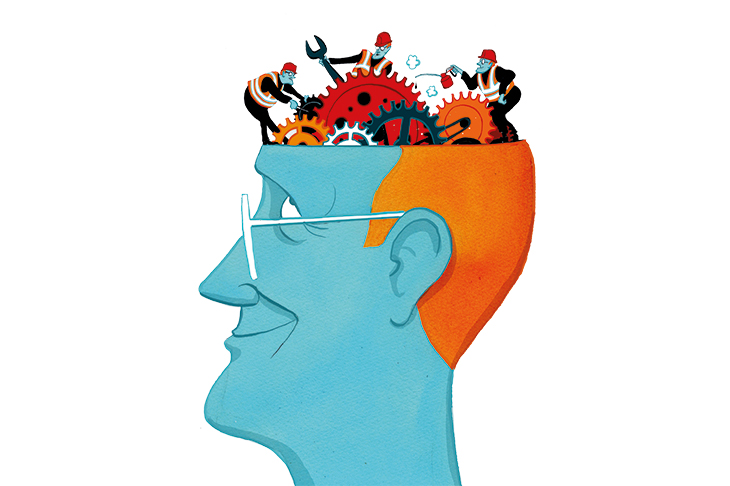‘Beep!’ This is one of the most maddening computer games I’ve ever played. I’m tracking a flock of birds, and when I hit the right one, it explodes with a satisfying ‘phutt’. But as I get better at spotting them, the birds scatter ever more wildly across the screen, and I hear that unforgiving ‘beep’: you missed.
Frankly, I feel like giving up. But many players don’t dare. For this is HawkEye, a brain-training program that claims it can sharpen my brain beyond simply getting faster at mouse-clicking. Trials have found that older people who play enough hours of this particular kind of game have fewer car crashes — and even, apparently, a lower risk of dementia.
‘Every week someone will ask me, will I be OK if I do crossword puzzles?’ says the bearded neuroscientist Henry Mahncke, CEO of the company Posit Science, which makes this game. ‘My answer is no. Yes, you are thinking — you’re trying to find an anagram or a synonym — but you’re not making the brain faster or more accurate. For that you need to challenge yourself.’
Not so long ago, people thought boys were naturally better than girls at science. We may be making a similar mistake when we assume older people can’t learn as well as younger ones. Until recently, we thought that the brain cells we were born with were a lifetime quota and that brains became fixed in adulthood. But in the past decade, with the help of MRI scans and experiments on mice and monkeys, neuroscientists have demonstrated comprehensively that the human brain remains plastic throughout life. Like Victorian cartographers, they have mapped the landscape of the brain to show that old dogs can learn new tricks — and in fact they must, to keep in shape.
When I set out to write a book about the burgeoning numbers of older people in the world, and the challenges they bring, I kept coming across data which suggested that we are far too fatalistic about many aspects of longer lives. Many of us can now look forward to an extended middle-age lasting well into our seventies, even beyond. The incidence of dementia has fallen by around a fifth in the past 20 years, partly because of giving up smoking. (The total number of people with dementia will keep rising because there are more old people, but our individual risk has fallen.) It is widely assumed that productivity declines after 50, but the average age of founders of the highest-growth American start-ups is now 47. But policy needs updating. The official definition of the ‘dependency ratio’, for example, assumes that all pensioners become a burden on other taxpayers from the age of 64.
If we are to enjoy this extra time, we need to extend our mental lifespans to match our physical ones. And that means making the most of breakthroughs in neuroscience which show that our brains keep learning and adapting throughout our lives. Brand-new neurons have been found even in the brains of 70-year-olds with terminal cancer. People have recovered from strokes, despite permanently damaging whole areas of their brains, because other areas have stepped in, like airline passengers seizing the controls from an unconscious pilot. Scientists are finding new ways to help people with psychiatric disorders overcome their conditions, by calming down certain circuits in the brain and rewiring others.
Growing evidence suggests our brains need exercise, rather like our muscles. ‘The best analogy is to the fitness movement,’ says Alvaro Fernandez, a Spaniard who runs SharpBrains, an independent consultancy tracking brain research in Washington, DC. ‘We went from having the general idea of fitness to having gyms, personal trainers and precise exercises. If I want to get stronger abs, I do sit-ups. If I want to be a better all-round athlete, I lift weights. The same will happen with the brain.’
It all started with the humble canary. Unlike other songbirds, which churn out the same old tunes, canaries are the hit record producers of the avian world, creating new melodies every year to attract a mate. On examining their brains, scientists discovered that they generate new brain cells or neurons each spring, almost doubling their brains in size. Later, it was discovered that humans also generate new neurons. We do this in the hippocampus, which lies deep under the cerebral cortex, learning and consolidating new information. Without it, we would not be able to remember where we live, or find our keys. (The reason why Alzheimer’s sufferers find it difficult to remember such things is because Alzheimer’s affects the hippocampus before any other part of the brain.) MRI scans have shown that London cabbies who’ve passed the Knowledge have larger hippocampi than ordinary mortals, as a direct result of learning the streets. In other words, cognitive exercise can produce physical changes in the brain.
A big question has been how to put the new brain cells we create to lasting good use, by incorporating them deep into mental circuits. Experiments with mice suggest three things help: aerobic exercise, social contact and new challenges. Eighteen-month-old mice, the equivalent of 65-year-old humans, have developed five times the number of new neurons as fellow rodents when given wheels to run on, tunnels to explore, and other mice to make friends with. They also learn to navigate mazes more proficiently than those raised in duller conditions.
Human brains benefit from aerobic exercise too. One group of older people who participated in an aerobic fitness program for three months were found to have significantly increased their brain volume, unlike another group who did stretching and toning — perhaps because aerobic exercise increases the blood supply and oxygen to the hippocampus. Moreover, exercise is increasingly recognized as protective against dementia. The 2017 Lancet Commission on Dementia found that ‘physical exercise and intellectual stimulation over the lifespan is associated with reduced risk of dementia in later life, even among individuals with genetic predisposition to dementia’. That doesn’t mean that Olympic athletes can’t get Alzheimer’s. But it is increasingly recognized that lifestyle influences our individual risk.
Just as we get physically fitter, and so can endure longer workouts, so the neurons in our brains start to fire faster, and more in sync with each other, when we repeatedly focus intensely on learning a new skill. Neurons which ‘fire together, wire together’: they give out clearer signals. This is important, because clearer signals improve memory.
One reason we forget things as we get older, scientists believe, is that our brains are increasingly struggling through ‘noise’: fuzzy signals given out by neurons which are not syncing properly. We process new events more slowly as we get older, which makes it harder to form a clear memory of someone’s name, or who said what at the party.
Many scientists are trying to find ways to reduce the ‘noise’ in our brains as we age. One way is challenging ourselves in ways which require our full attention. There has been research into the effects of playing a musical instrument. Musicians who practice regularly and intensively have been found to have more grey matter in part of their frontal lobe, and less age-related degeneration in other parts of the brain, than non-musicians. One group of people over 75 who frequently played a musical instrument were found less likely to have developed dementia after five years than those who rarely played.
‘You’re never too old to learn,’ says Dr Lara Boyd, a brain researcher at the University of British Columbia who works with stroke patients. ‘There’s no drug you can take — the primary driver of neuroplastic change in your brain is your own behavior. But the dose needed to learn new skills, or relearn old ones, is very large.’ Some patients have regained the use of paralyzed limbs by making painstaking, repeated attempts.
Some new skills are definitely harder to acquire at 50 than at 12, and some are impossible: perfecting a foreign accent, for example, can only be done in childhood. Older people take longer to learn to juggle, and some cannot master it at all. But this may be partly about determination. One African great-grandmother learned to read and write at the age of 90. Some studies suggest that an adult’s own lack of confidence, especially in their ability to memorize, can be self-fulfilling. That’s a downside of neuroplasticity: it is self-reinforcing. ‘Neuroplasticity can be positive — you learn something new — but it can also be negative,’ says Dr Boyd. ‘Your brain is being shaped by everything you do, but also by what you don’t do.’
There is now a whole industry providing online brain-training apps, which claim that daily practice will improve your mental acuity. It’s wise to view these claims with some skepticism. In 2016, a company called Lumosity.com agreed to pay a $50 million settlement to the US Federal Trade Commission over claims of false advertising, which the FTC said had ‘preyed on consumers’ fears about age-related cognitive decline’. An hour spent drilling on a computer game may not be worth it, a group of experts at Stanford University have warned, ‘if that is an hour not spent hiking, learning Italian, making a new recipe or playing with your grandchildren’.
Some types of games, however, show real promise. The one with the birds that was driving me mad is designed to improve speed processing: how fast and accurately your brain processes what you see. A big question about such games is how far improvements from online games generalize to the real world: can they enable you to find your keys, for example, rather than just improve your ability to click? A ten-year trial of a ‘useful field of view’, or speed processing game, has found lasting cognitive improvements in players: committed players were half as likely to experience a car crash as non-players.
The most recent finding from that same trial is that volunteers who completed at least ten hours of training were 29 percent less likely to get dementia than those in the control groups. These figures are not overwhelming. The risk of getting dementia in the control groups was only 11 percent. And no one is claiming that a computer program can treat dementia once someone has developed it. Nevertheless, it does suggest that certain types of training might improve the brain’s resilience.
In 2017, the US National Academies of Science, Engineering and Medicine examined 17 possible ways to slow cognitive decline and dementia. The three most promising were physical activity, blood pressure management and cognitive training, including speed-processing programs. It said that none were yet backed by sufficiently strong evidence to launch a public campaign. But the evidence is growing for all three.
‘No pain, no gain’ urge the physical fitness freaks. This seems to apply to mental exercise too. The brain may really be like a muscle, and able to get stronger throughout life.
Slumping into a comfortable middle-age may be tempting. But once we appreciate the enormous potential of our brains, it is clear that we should be avoiding the ruts and doing regular mental heavy lifting: through physical exercise, social contact and new challenges. Old dogs, it turns out, may be a lot younger than they thought.
This article was originally published in The Spectator magazine.

























